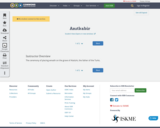
The ceremony of placing wreath on the grave of Atatürk, the father of the Turks.
- Subject:
- History
- Political Science
- Material Type:
- Primary Source
- Author:
- Gökçe Topluk
- Date Added:
- 03/10/2022

The ceremony of placing wreath on the grave of Atatürk, the father of the Turks.
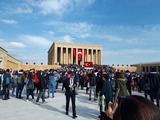
Anıtkabir
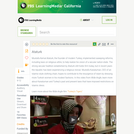
This Wide Angle video segment illustrates Islamic and secular elements of life in Turkey, and introduces Mustafa Kemal Ataturk, the first president of Turkey, and his reforms.

This course centers on mechanisms of civilian control of the military. Relying on the influential texts of Lasswell, Huntington, and Finer, the first classes clarify the basic tensions between the military and civilians. A wide-ranging series of case studies follows. These cases are chosen to create a field of variation that includes states with stable civilian rule, states with stable military influence, and states exhibiting fluctuations between military and civilian control. The final three weeks of the course are devoted to the broader relationship between military and society.
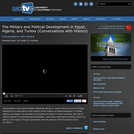
Conversations host Harry Kreisler welcomes Steven A. Cook of the Council on Foreign Relations for a discussion of the impact of the military on democratization in Turkey, Algeria, and Egypt. He analyzes the structure of power in these countries, the role of Islamic parties in furthering democratization, and raises important questions about U.S. policy in the region through comparison with the policies of the European Union. (51 minutes)

This seminar considers “difference” and “sameness” as they have been conceived, experienced, and regulated by peoples of the Middle East, with a focus on the 19th and 20th centuries. The first half discusses the Ottoman Empire by exploring how this multiethnic, polyglot empire survived for several relatively peaceful centuries and what happened when its formula for existence was challenged by politics based on mono-ethnic states. The second half of the course focuses on post-Ottoman nation-states, such as Turkey and Egypt, and Western-mandated Arab states, such as Syria, Lebanon, Palestine, and Iraq. Finally, the course concludes with a case analysis of Israel.

This subject examines interactions across the Eurasian continent between Russians, Chinese, Mongolian nomads, and Turkic oasis dwellers during the last millennium and a half. As empires rose and fell, religions, trade, and war flowed back and forth continuously across this vast space. Today, the fall of the Soviet Union and China’s reforms have opened up new opportunities for cultural interaction.
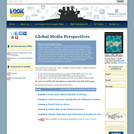
This kit provides the materials and background information needed to engage students in a dynamic and constructive process of learning how global media perspectives differ based on country of production, media source, target audience, and political and social context. There are five lessons representing important issues and media documents from: Africa (news and documentary film clips about the food crisis), Latin America (editorial cartoons about immigration), Europe (news and documentary film clips about Islam and cultural identity), India (magazine covers about India's rise in the global economy), and Southeast Asia (websites concerning Islamic majorities and minorities).
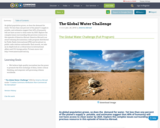
As global population grows, so does the demand for water. Yet less than one percent of the planet’s supply is potable, and estimates suggest that 40% of humanity will not have access to clean water by 2025. Explore the complex issues surrounding this precious resource in this episode of America Abroad.
America Abroad is an award-winning documentary radio program distributed by Public Radio International (PRI) and broadcast on public radio stations nationwide. Each month, we take an in-depth look at a critical issue in international affairs and U.S. foreign policy.
To learn more visit http://www.americaabroad.org

This course surveys the history of the Middle East, from the end of the 19th century to the present. It examines major political, social, intellectual and cultural issues and practices. It also focuses on important events, movements, and ideas that prevailed during the last century and affect its current realities.
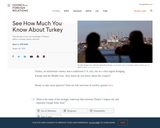
On behalf of the Council on Foreign Relations (CFR), take this quiz to test your knowledge of Turkey's politics, economy, history, and more.